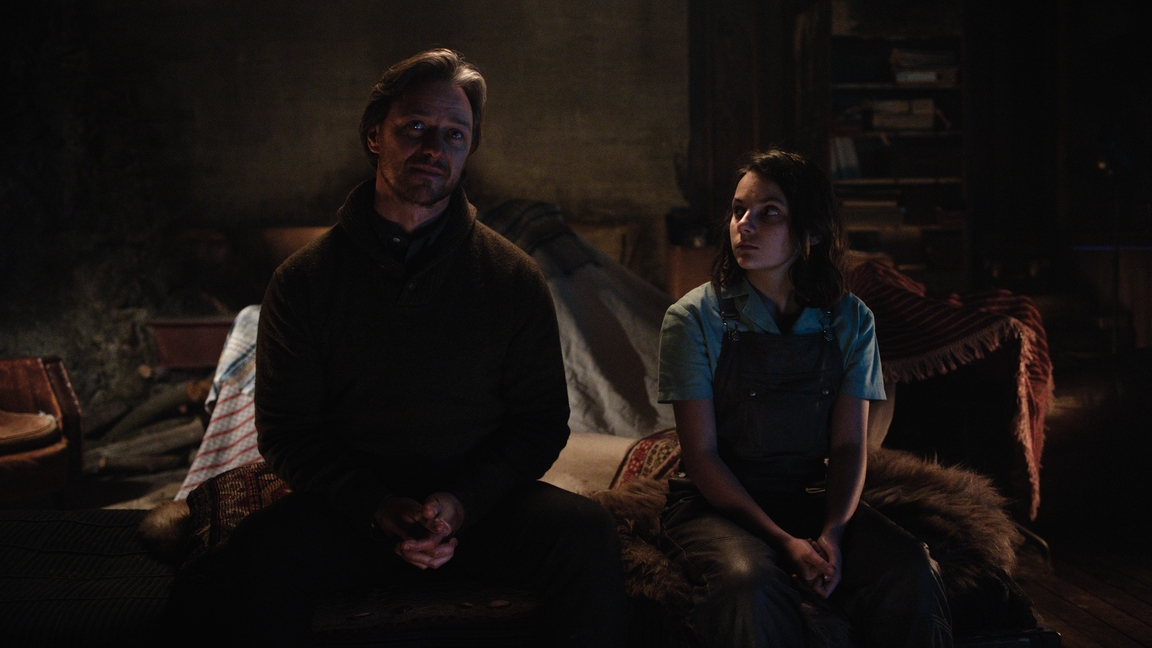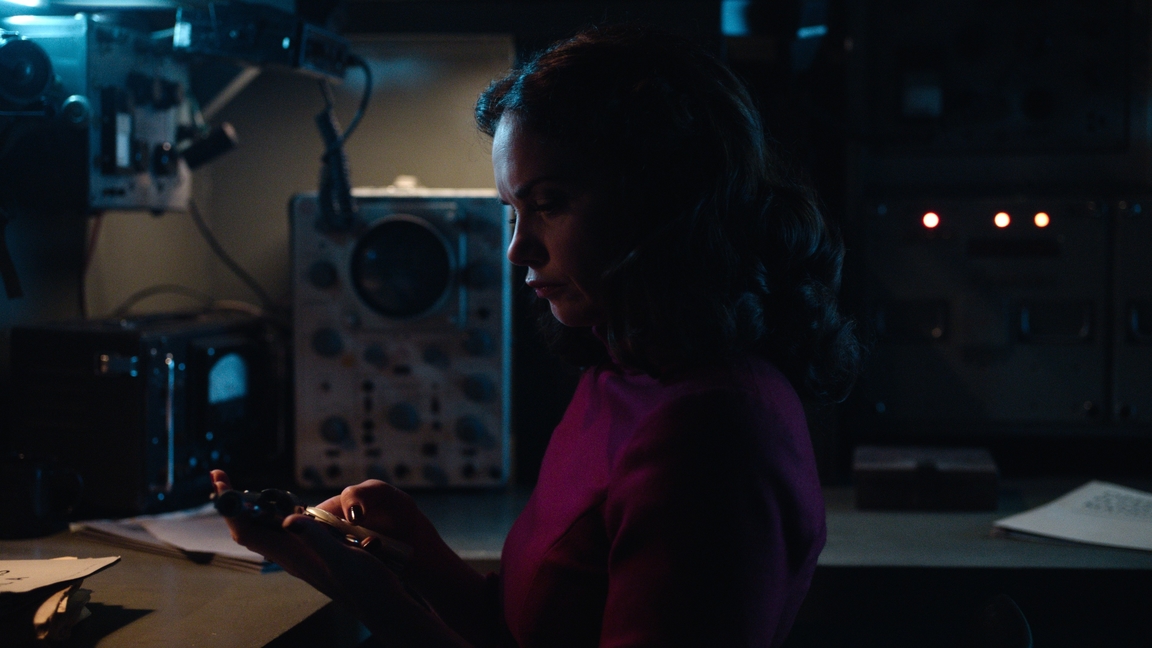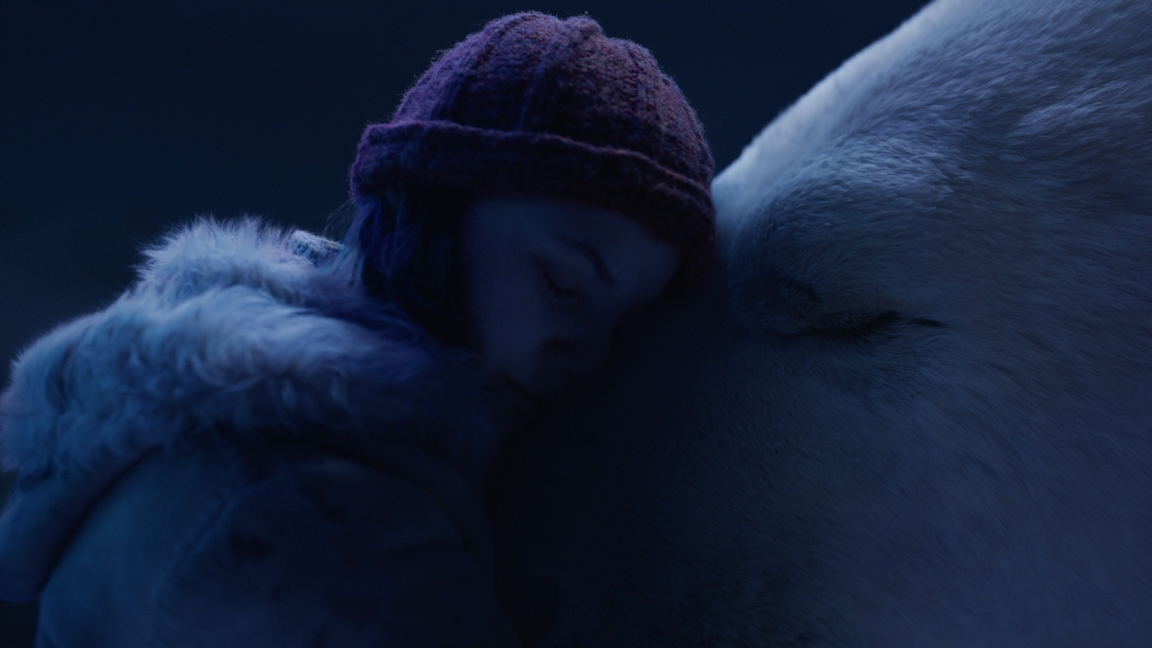So, here we are. After leaving Jordan College and going to Mrs. Coulter’s luxurious London loft, then running away with the Gyptians, sailing north, only to find herself in peril at dangerous locations like Bolvanger and Svalbard, Lyra has arrived at the northern laboratory where Lord Asriel is conducting his heretical research.
While I certainly enjoyed “Betrayal,” especially as a finale episode leading into season two, the episode marks clearly the show’s effort to move away from the philosophy and religion that formulate the thematic backbone of the episode, while simultaneously introducing the concepts to the audience.
As with before, my major gripes with the episode exist when in comparison to the book, as well as Lyra’s role as a protagonist. The Golden Compass has my favorite ending out of the three books of the original series, after spending an entire book with Lyra, we see the culmination of her efforts to reach her father and we finally see the two people responsible for her existence — her biological parents — interacting together.
Lord Asriel and Mrs. Coulter are easily two of the most interesting characters of the series and rarely do we get to see the two of them interact (in fact, we barely even get Asriel in The Subtle Knife). We can easily see the traits of these two ambitious, intelligent, and cunning people reflected in their progeny. It’s especially emphasized when we see them interact with Lyra and see just how alike she is to her parents despite having little to do with them her entire life.
An interesting change that’s manifested from page to screen seems to be just how sympathetic characters like Asriel and Mrs. Coulter are. I will go on record saying that about 50% of the time in my episode notes, I refer to Asriel as Lord Asshole, simply because I find him to be an impossibly arrogant character.
However, embodied by James McAvoy, I find myself far more sympathetic to his character. The way he seems to be afraid of bonding with his daughter, afraid to feel paternal affection for her, even as it creeps into him with her arrival at the laboratory, speaks of a man who might actually love his daughter had he not let his own ambition stand in the way.
Similarly, Mrs. Coulter is written to be an unlikable character, and up until the final act of the third book, she seems to be wholly selfish and even a little resentful of her affection for her daughter. His Dark Materials takes a decisive turn towards making her more sympathetic not only through Ruth Wilson’s performance, but also within the canon of the script. By the end of “Betrayal,” Mrs. Coulter has made a decision not to go with Asriel into a new world due to her loyalty to Lyra.
While this is a heartwarming and hopeful sentiment for Mrs. Coulter, it does gloss over the larger philosophical and theological debates that rage beneath the surface of a children’s tale about daemons and world-hopping. We see a little bit of that in Asriel’s conversations with Lyra and Mrs. Coulter, but the hard concepts presented in The Golden Compass are missing here.

Instead of leaning into the more complex conversations, His Dark Materials instead doubles down on emotion. When Asriel and Lyra finally get a chance to talk, Asriel is desperate to keep his distance from his daughter. Lyra passionately tells him that she would have been proud to call him her father and it is clear that this statement has an effect on Asriel.
And when they joke about Mrs. Coulter being her mother, Lyra saying, “Your choice in women is almost as bad as your choice in bears;” there’s a sincere moment of bonding between the two as they laugh over the comment. Asriel contradicts his own intention constantly with his daughter, demanding estrangement on one hand but drawn to the natural bond between father and daughter on the other. In one moment, he coldly tells Lyra that he never called himself a father, and then in the next he is balking at the idea of Lyra dropping his family name in support of Lyra Silvertongue.
It’s this very conflict that actually makes this version of Asriel so intriguing. Book Asriel is often aloof and unreachable, cold and isolated whenever Lyra speaks to him. And while this version is hardly winning any Father of the Year Awards, the conflict denotes a genuine love that felt missing in the books. When Thorold speaks to him about Lyra, Asriel makes it clear that he intends to leave both her and this world.
He’s not a man that is easily swayed and once he decides to do something he does it. Mrs. Coulter comments on this when she speaks to Thorold later, saying, “He’s always been so reckless, he’s never treated any of us well.” And it means something to Thorold, as well, who had been preparing to journey with Asriel to another world and has been effectively told to stay behind and raise the man’s daughter instead. And to add the cherry on top, he refuses to even say goodbye to her.
Of course, chilly receptions and erstwhile fatherhood is not why I’ve given the name Lord Asshole to Asriel, instead it’s his sacrifice of Roger. While neither Marisa nor Asriel can fathom the thought of putting Lyra through intercision, there’s something distinctly cruel and evil about Asriel’s mission. Yes, Marisa was experimenting on dozens of children, but one could make an argument she was doing it in hopes that she would be severing children from a lifetime of sin.
Asriel knows that Roger is simply a sacrificial lamb. The episode candy coats Roger and Lyra’s relationship as it has been all season — as I’ve said before, Book Lyra basically forgot about Roger once she joined up with the Gyptians until she met him again at Bolvanger — but it’s effective in reminding us that we should care about Roger, if a little heavy-handed.
Roger, like us, is reasonably suspicious about Asriel after his dramatic reaction to the children arriving. However, despite his instincts, he stays with Lyra at the laboratory, playing with her and comforting her. He even goes to suggest that she could use the alethiometer to figure out what is going on with Asriel, but Lyra believes that it only tells her what it wants her to know. This proposes the idea that the alethiometer is more than just a tool, but rather something that has consciousness or even sentience.
Speaking of the alethiometer, when Lyra presents it to Asriel, believing that she’s meant to give the tool to him to use, Asriel rejects it. He doesn’t seem to be too concerned with the alethiometer now that he’s discovered a way to open up a portal to another world. When he wakes Lyra up to tell her about dust and give her an idea of what it means to the people in Lyra’s world it’s the first glimpse we’ve gotten at all into a world that is dominated by religion.
The Magisterium believes that dust is sin, quoting a line from their bible that reveals that when Eve was tempted by the serpent and bit the apple, that was when her daemon settled. And because dust is a physically measurable elementary article, it can be abused by the Magisterium to further their agenda. Since discovering that dust collects more when children transition into adults during puberty, dust has been viewed as the original sin.

This explains the goals of Mrs. Coulter in Bolvanger, although Lyra is quick to shine a light on the reality that intercision does nothing but leave a person empty. This conversation between Lyra and Asriel is by far one of the most interesting in the season. Not only does it hit on the concept of dust, but it reflects on Lyra’s relationship with her parents, a human’s intense tie to their daemon, and the natural reaction that occurs when they are cut from their daemon.
And while it is heartening to hear Asriel tell Lyra, “You were never sent to me at all, but I am glad you came,” and “You’re the product of something extraordinary,” one can’t help but be suspicious of those words after Lyra declared that she intended to leave as soon as possible. Is Asriel being genuine, or does he simply want her to stay so Roger can be his sacrifice? I guess it could be both, which might make it worse.
After a couple of episodes on the bench, the Magisterium is actually taking some action this episode. It often feels like Mrs. Coulter is the only one doing any work in the organization, with her work at Bolvanger and her machinations with Iofur, very little seems to be attributed to the actual Magisterium. Again, this episode sees Mrs. Coulter taking charge and sidestepping the often weak and fairly useless Father McPhail.
Although McPhail has been able to get in some barbs from time to time, Mrs. Coulter has almost always been able to hold the upper hand over him. McPhail’s interaction with Mrs. Coulter gives us an interesting insight into her past as he comments on her relationship with Asriel, wondering what it was that actually made her “melt” when she met Asriel.
Asriel and Mrs. Coulter have this incredibly interesting relationship. It’s not necessarily that they might both respect one another equally, but they are drawn together like magnets and their equal passion and ambition are what define them and put them on a path towards one another. Everything in the episode falls to the wayside as we head towards the climax and at some points you almost want to just skip ahead to the meat of the episode rather than watch the Magisterium stomp around Asriel’s lab or flash to Boreal’s storyline.
When Lyra realizes that Asriel has packed up his stuff and left and taken Roger with him, she deduces — either too quickly or too slowly, I can’t decide — that Asriel is taking Roger to cut him from his daemon and use the energy force that is emitted in the process.
Iorek is quick to answer her call to take her up to the moutain after Asriel. After a scuffle with the Magisterium, Iorek takes Lyra as far as he can go before parting ways with her. I wished there had been more Iorek and Lyra, because Iorek is one of my favorite characters of the series but seeing Lyra claim Silvertongue as her name might have to be enough for now.
Lyra rushes up the mountain, but it’s all in vain as Asriel easily maneuvers Roger into an intercision cage and prepares to cut him from his daemon. Asriel tries to reason to Roger, “In war there are casualties, and believe me when I tell you this is a war. One that will free humanity forever.” How is this different from Mrs. Coulter and her goal to free humanity from sin? As we’ll eventually learn, Asriel intends to take on The Authority, a god-like figure in their religion, and for him, cutting Roger is just a necessary on the road for freeing everyone.
I can’t tell if it’s because this scene is cut in a weird way, or if I was expecting something more like the book, but ultimately Roger’s cutting was a disappointment since Asriel doesn’t even know she’s there, and the force of the cut knocks her off the summit and she is not present for when Marisa and Asriel reunite. One of the key moments of alienation for Lyra shouldn’t just have been what happened to Roger, but hearing Asriel’s “few to save the many” justification right before seeing him look up at the portal in absolute glee.
By the time Marisa arrives, Roger is cut and Lyra is knocked out cold. In the book, the importance of the scene and the connection between the two characters is played out two-fold. We hear them as they debate and as Asriel tries to convince Marisa to come with him, but we also see their daemons interacting with one another. Stelmaria and Marisa’s monkey daemon playfully fight and writhe around with one another in a manner that really can only be described as sexual and not the least bit menacing.
It’s a scene that perfectly lays out the purpose of a daemon. And in the series that’s continuously shown Marisa harming her own daemon, this would have been a great moment to showcase this. But unfortunately, we see this for only a few moments before focusing back on Asriel and Marisa. He tries to win her over to his cause; “No more oppression, no more abuse, no more darkness, no more suppression of knowledge,” he says, romanticizing the tear between their world and the other, “That’s the sun of another world.”
If McPhail was wondering how an ambitious young woman of an advantageous marriage fell from grace, he needs only to see this moment between the two. “We could take this universe apart and put it back together again,” he almost begs, asking her to come with him and fight The Authority together, calling her out about her ambition, her work, and her identity. But, the strongest deviation from the Book Mrs. Coulter is when Marisa rejects Asriel, not because she still has some kind of faith in the Magisterium or doubt in him, but instead, she rejects him so that she can stay in the same world as Lyra.
She tells Asriel goodbye because she believes her place is with Lyra. This is a VERY early development, and it might be seriously confounding for some book readers to see this side of Mrs. Coulter so soon. Asriel, however, is not as shocked by this and instead of pleading with her anymore, he heads through the portal, intent on his mission.

It’s devastating that we didn’t get to see Lyra react to this, but with Mrs. Coulter’s confession, it’s probably for the best since Lyra will view her mother as an opponent up until the very end of the series. Instead, we come back to Lyra after she’s hidden from Mrs. Coulter and gotten back up to the summit to find Roger. It’s unclear if Roger is dead or not. She says he’s still warm, but his daemon disappeared as opposed to the ones in Bolvanger who were simply cut away.
Semantics aside, this is a watershed moment for Lyra. Plagued by survivor’s guilt, she mourns Roger alone on the top of the mountain, the portal to another world behind her. Pan realizes that all of the adults keep saying that dust is bad, but perhaps it actually needs protecting.
Making an oath to make sure Roger did not die/get cut in vain, she picks up Pan and decides to go through the tear in her world into a new one. “We’d be alone,” Pan says to her. “We’ve always been alone,” Lyra admits to herself.
In Will’s world, we’ve witnessed Boreal hunting after Will intermittently throughout the episode. I’ve really liked the Will scenes in this season, but this episode has made it feel all the more intrusive at the climax of the story. As Boreal learns from the alethiometrist at the Magisterium that Will’s father was searching for a knife in a tower surrounded by angels and that Will would lead him to that knife, this kicks Boreal into high gear.
Book readers will recognize the tower as the one in Cittagazze and the knife as the subtle knife, which is exciting for season two. Boreal seems to not only know about the tower but also is intent on finding the knife. Will’s scenes in the episode are mostly him dodging cops, worried about the news of him murdering Boreal’s henchmen, and hiding out. It’s a severe tempo shift each time the episode cuts to it and it doesn’t actually pay off until the very end.
As Lyra considers crossing over to the portal, Will meets a cat (far more notable in the books, since Will is very attached to his pet cat) and follow it through a gate and into a tear in the worlds. It looks like the one that Boreal comes through, but it’s not made entirely clear. This scene is paralleled with Lyra taking Pan with her through her tear before the camera pans up to show the city in the northern lights.
Inevitably, book readers are bound to have complaints in this adaptation. But Jack Thorne’s version leaves out some clear thematic elements that still leave the show feeling hollow at times. As much as I loved the moments meeting Will so early, it feels like it’s taken away from Lyra’s story. The decision to not only follow Lyra ultimately feels like it weakened the backbone of the tale.
Certainly, a lot of this could be attributed to the shift in medium. In the books, we are able to learn much about the world through Lyra’s inner thoughts. Her connection with Pan can’t just be explained simply as a physical embodiment of her soul because it never is simply explained like that. Daemons are integral and the mythology around them is as vital to the world as Lyra’s story is.
I can’t help but think what this show could have been had it not been produced primarily for the BBC audience. Would the bear fight have been more visceral? Would the daemons have been more plentiful? Would the theological aspects be more impactful? His Dark Materials is a beautiful adaptation, and by far more successful than the 2007 The Golden Compass, but there’s always room to grow.
Perhaps in season two, when we finally get our two protagonists together, when we’re staunchly in a totally new world, we’ll get a little bit more of the meat of the series.